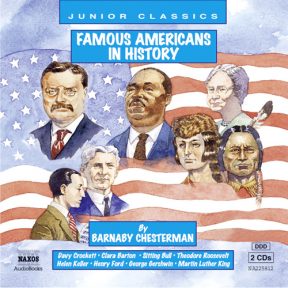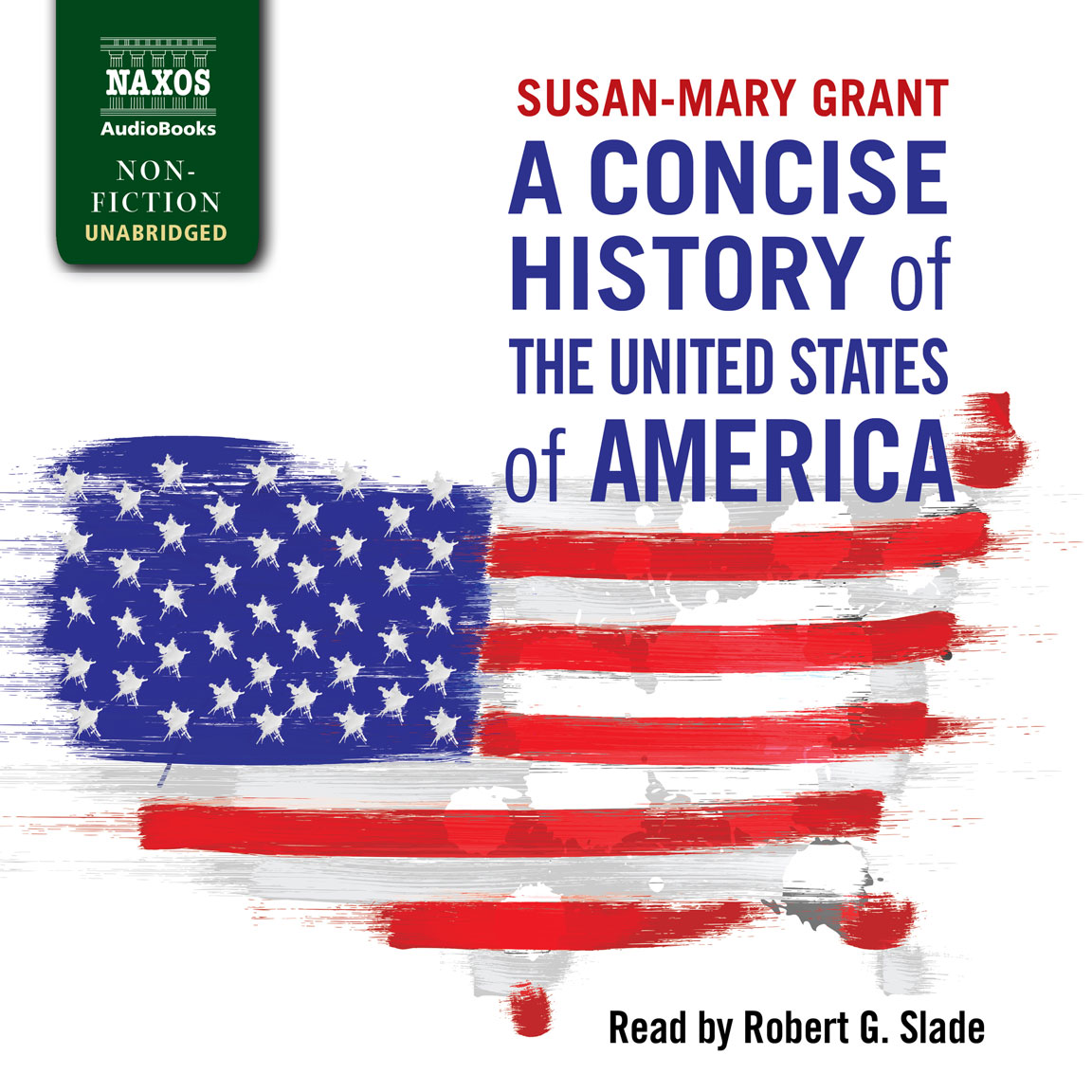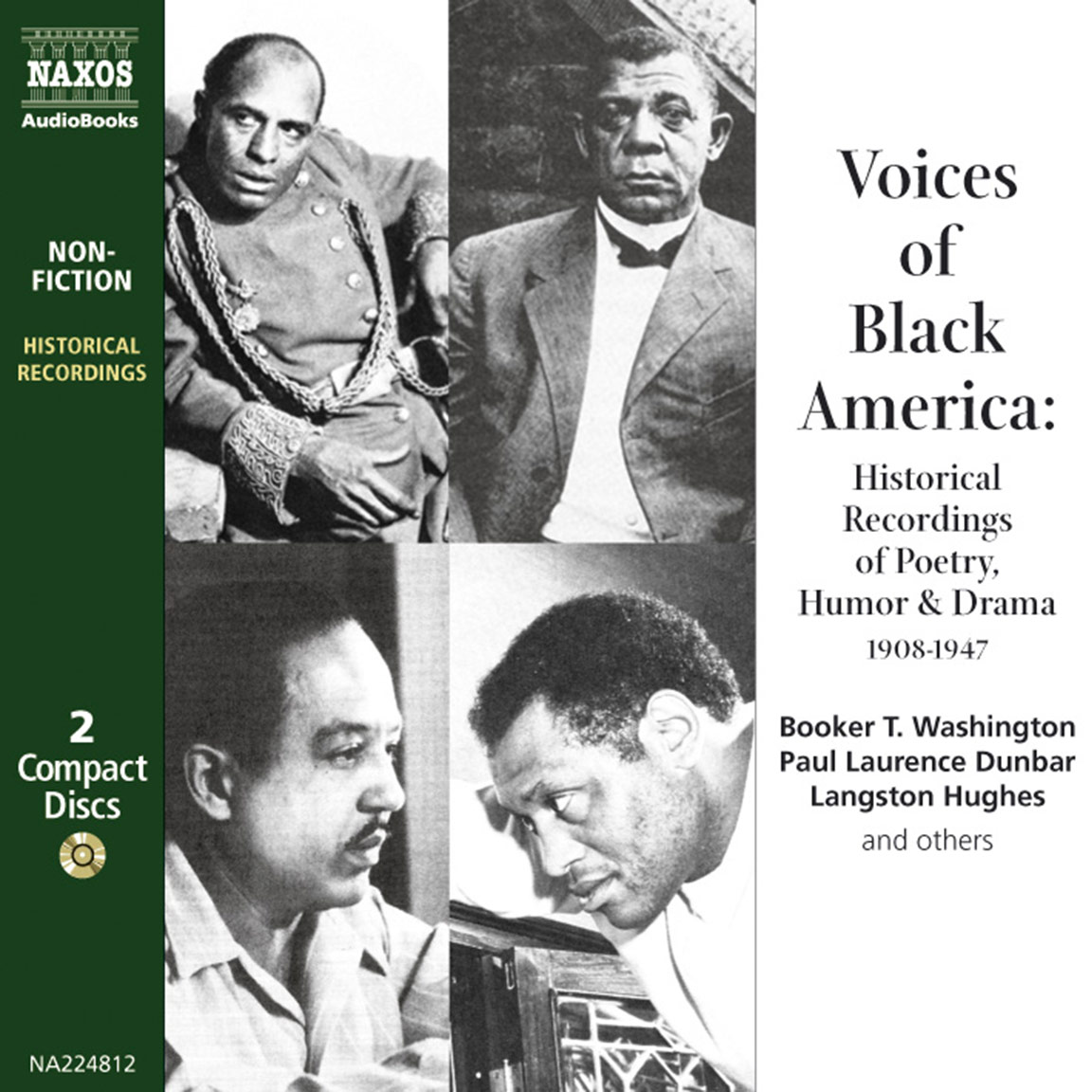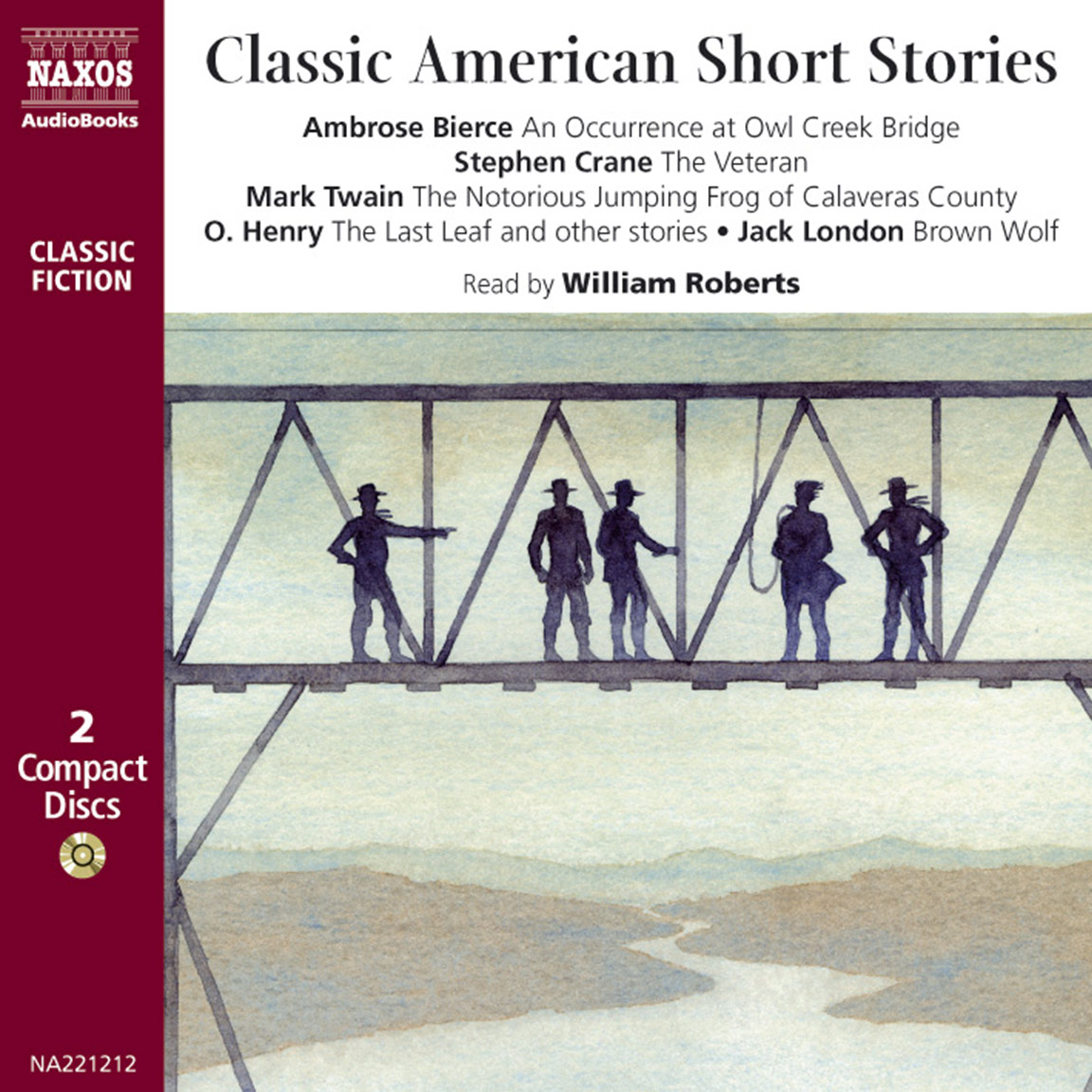
Audio Sample
Barnaby Chesterman
Famous Americans in History
Read by Lorelei King & Kerry Shale
unabridged
Here are the life stories of eight remarkable people who were born and grew up in America and who made their mark upon American history. They represent the remarkable individuality and sense of enterprise and courage that has marked the American hero. Their personalities were very different, from the frontier spirit of Davy Crockett and inventive, entrepreneurial qualities of Henry Ford, to the quieter, but no less impressive courage of Clara Barton and Helen Keller. And then there was the unique story of Martin Luther King.
-
Running Time: 2 h 26 m
More product details
Digital ISBN: 978-1-84379-826-2 Cat. no.: NA225812 Produced by: Nicolas Soames and Sandi Gilbert Edited by: Dan King BISAC: JNF025060 BIC: YNH Released: December 2004 -
Listen to this title at Audible.com↗Listen to this title at the Naxos Spoken Word Library↗
Due to copyright, this title is not currently available in your region.
You May Also Enjoy
Booklet Notes
Each country has its heroes – the men and women who, by their individual achievements and courage, changed the character of their nation. And this is particularly true of the United States of America, a country where the effort of the individual is particularly highly regarded.
Here are eight men and women whose life and work made an unforgettable mark upon American history. They came from very different walks of life, achieved very different things, but by their imagination, their effort and their perseverance they enabled the United States to march further along the path of progress.
Of course, the history of the United States is so rich in such people it is very difficult to make a choice for this recording. The stories of George Washington and Abraham Lincoln, two of the most important presidents, have already been presented in Naxos AudioBooks’ collections of world figures: Famous People in History, Volumes I and II.
But these men and women – some quite ordinary in many ways – represent the variety of American people. Above all they show how people who do not appear to have any particular natural talent (they were not child prodigies like Mozart, nor were they born to rule like Alexander the Great), emerge as remarkable adults whose names will never be forgotten.
These eight figures are presented in chronological order.
DAVY CROCKETT (1786–1836)
The Spirit of the American Frontier
Davy Crockett is perhaps the most unusual hero in this collection. He didn’t win any major battles, he didn’t discover anything, and he didn’t write anything of note (though his autobiography is fascinating, even if some of it may be as much fiction as fact). But Davy Crockett is typically American.
A backwoodsman with very little education, he was most content when deep in the Tennessee woods with his dogs, hunting bears. He fought and grafted his way into manhood, emerging with simple principles of right and wrong, tempered by his personal experiences of life on the frontier – exciting, hard, dangerous but satisfying.
When he went into politics, he must have viewed the cut and thrust of elections and lobbying as much the same as his life in the woods. Maybe it was because he could see the wood for the trees and because he was such a sure shot that he did so well in politics.
In many ways, with Davy Crockett, the legend is more important than the man. That is why we start with the famous song. But there is no doubt that Davy Crockett inspired millions of boys all over the world. Here was a man who came from a very simple background, walked tall in the woods, succeeded also among the clever politicians of the big towns, and was still able to walk away and fight for the independence of Texas – and ultimately die for the cause.
In many ways, he is the ultimate American hero.
CLARA BARTON (1821–1912)
America’s Angel of the Battlefield
Clara Barton is another example of individual courage. She had a timid personality, yet her whole life was one of boldness – particularly because she was a woman in a man’s world. Her work in caring for wounded men in the Civil War set new standards in the United States as Florence Nightingale did for nursing in the Crimean War. She was always ready to promote causes she believed in: after the Civil War ended, she fought for women’s rights and black rights.
And even when she went to Europe for a rest, she saw her kind of campaigning spirit was needed to expand the Red Cross network, and she plunged herself once more into action.
Many advances in society, in politics or in war are seen in terms of concrete achievements – an invention, a political coup or a battle won.
But Clara Barton demonstrated that equally important are the quieter victories, where humanitarian progress is made.
SITTING BULL (1831–1890)
Native American Warrior and Hero
It is difficult for us to imagine what it must have been like to be a Native American in the 19th century. The way of life the Sioux, Cheyenne and other tribes of the plains – the age-old life of the hunter-gatherer, living close to nature – were being swept aside by invaders who were essentially town-dwellers and farmers. At first, the tribes had neither little understanding of the pressures from the old world (Europe), which forced the immigrants to look for new lands, nor the sheer numbers involved. This meant that no matter how fiercely Sitting Bull and his men resisted, there was simply no chance of success. Yet Sitting Bull defended his lands and led his men with honour.
And when final capitulation came, and he went to the reservation, he tried living with dignity, tried to understand the ways of the conquerors. His sad end marked a low point in that relationship, but his life and death is an example of dignity within tragedy.
THEODORE ROOSEVELT (1858–1919)
America’s 26th President
It was the man, as much as the achievements, that marked the life of Theodore Roosevelt. Though born into wealth, he had poor health and could have accepted the life of an invalid. But he refused this and, with his father’s help, let his strong character and personal energy overcome those limitations. By working hard on his physique and his sports, as well as his studies, he fed his urgent need to succeed in all areas. This resulted in an unusual political leader, as comfortable in action as in Congress. His contact with Japan even resulted in his learning judo – then regarded very much as a mind and body skill, concerned with the building of character – to add to his boxing accomplishments. It is significant that in addition to his political work in the United States, as well as his foreign diplomacy, he also introduced numerous national bird reserves and national parks – an early example of ‘green’ awareness.
HELEN KELLER (1880–1968)
America’s First Lady of Courage
The life of Helen Keller is one of remarkable personal courage. Here was a person who could simply have given in. A young, lively, intelligent child cruelly forced into a silent dark world of deafness and blindness by meningitis. Yet given half a chance – supportive parents and the huge fortune to meet a woman like Anne Sullivan to lead her out of her isolation – Helen Keller showed how a human spirit could shine brightly, no matter what the difficulty. Her life story is one of the most inspiring in the history of mankind anywhere. She didn’t give in to self-pity at any point – she fought to live life to the full, and by her personal example affected the people she met in many countries, the people she corresponded with and the millions who read about her.
Helen Keller will continue to be a heroine for us all.
HENRY FORD (1863–1947)
Father of the American Automobile
More than any single person in the history of the United States of America, Henry Ford represents the entrepreneurial spirit. He was the modern equivalent of Bill Gates – what Gates was to the computer and Microsoft, Ford was to the automobile and the Model T Ford.
His interest in transport emerged at an early age, when the sight of a steam engine laid the first seeds to the eventual development of the Model T. But he was more than just an inventor. Henry Ford changed America because, in addition to being an imaginative engineer, he had remarkable organizational ability – allowing him to run a big and successful company – but also a commercial and social vision. He saw that the car could be for everyone, and not just for the rich. ‘I will build a car for the great multitude,’ he declared. And that is just what he did.
By 1912 he had not only created the Model T, but had also started the dealer-franchise system, with 7,000 Ford dealers throughout the United States. Next was his manufacturing break-through, with interchangeable parts and the creation of the assembly line concept. He was ready to supply the demand – and it was huge. More than 15 million Model Ts were sold.
When he died, he left much of his multi-million fortune to the Ford Foundation to promote inter-national understanding – yet another generous and visionary concept.
GEORGE GERSHWIN (1898–1937)
Rhapsody of an American Composer
Summertime, Swanee River, Fascinatin’ Rhythm, The Man I Love, I Got Rhythm and Embraceable You are just a few of the great songs written by George Gershwin, one of the most important American composers. Like many masters of the musical, George Gershwin came from an immigrant family – his parents were of Russian-Jewish background – but he absorbed the very nature of American music. His natural gift for the piano gave him a good start, but it was his ear for popular tunes that allowed him to make his mark early on as a composer. He made the music swing.
But George Gershwin also liked classical music – he grew up knowing Mozart, Beethoven and Chopin – and it was always his aim to write both popular music and concert music. This was unusual.
By having concert hits with works such as Rhapsody in Blue and An American in Paris, and adding a piano concerto, he secured a place in concert halls throughout the world for his music. And although his opera Porgy and Bess was initially well received, it is now regarded as the first important American opera.
MARTIN LUTHER KING (1929–1968)
Vision of the American Dream
The history of America has been shaped by the tragedy of slavery. For over two hundred years, millions were kidnapped from their homes in Africa and taken to America to work the land and serve white masters. And though the Civil War ended slavery, it did not immediately result in equality for the former slaves. Some 65 years later, when Martin Luther King Jr. was born, there was still discrimination against the black population, especially in the southern states.
Using his intelligence, education, courage and humanitarian principles, Martin Luther King set out to change the attitudes towards African-Americans, to abolish laws which discriminated against them, and to fight for equality of rights.
As late as the 1960s, laws existed which prevented black and white children from being educated at the same schools, forced black women to give up bus seats for white men, and which allowed restaurateurs to refuse to serve black customers.
Yet taking his cue from the Indian leader Mahatma Gandhi, King decided to lead a peaceful revolution – to change the laws through quiet protest, not violence.
He succeeded and gained the respect of millions. His tragedy was that he was assassinated at the peak of his success. The United States of America would not be as it is today, were it not for the peaceful but determined campaigns of Martin Luther King.
Notes by Nicolas Soames




